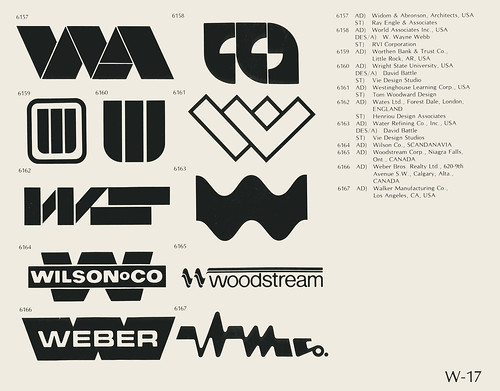Merlin’s weekly podcast with Dan Benjamin. We talk about creativity, independence, and making things you love.
Merlin's blogVintage logo book scansMerlin Mann | Mar 18 2008Vintage Logos - a photoset on Flickr Wow, this is fun for you design and identity nerds -- 120 scanned pages from a book of logos that appears to be from the mid-70s or so (nb: the logos for the U.S. bicentennial and Montreal olympics are included). I'm immediately struck that you could present this many logos in literal black and white; it's amazing how many logos today fall apart if you remove the colors or (God forbid) the gradients. Kinda Related: if you're a logo nerd, monitor (43f site designer) Chris Glass's "design" tag for running coverage and commentary on the (d)evolution of logos over the years. Highlights: "Accepting change," "roundy, 3d, swoosh and twirl," "dog eared," "Another one bites the dust," and "CBS, 2007." [via: Metafilter] read more »7 Comments
POSTED IN:
Video: Jon Kabat-Zinn on mindfulness and "falling awake"Merlin Mann | Mar 17 2008YouTube - Mindfulness with Jon Kabat-Zinn Jon Kabat-Zinn is the founder of the Center for Mindfulness in Medicine, Health Care, and Society at U Mass, and he's highly regarded for his role in bringing mindfulness into the mainstream of medicine. He's also an illuminating writer and speaker on the ways that mindfulness meditation can improve health and reduce stress. I really enjoyed this hour-plus talk Kabat-Zinn delivered at Google last year. It's a terrific introduction to meditation that includes a long portion where you can "meditate along," learning how to follow your breath and become more aware of being in the moment. (I doubt I'm the only one who'll benefit from that bit of help today). read more »POSTED IN:
Your Story: Throwing new tools at a communication problem?Merlin Mann | Mar 15 2008I'm working on a (likely non-43 Folders) piece about a topic that seems to keep coming up whenever I talk with people about how their team plans, collaborates, and generally communicates with one another. I'd love to hear from you in comments if you have a contribution to make. What’s your story?Do you have a story about a time when your team or company tried to solve a human communication problem by adding a new tool? In your estimation, how did things turn out? read more » POSTED IN:
Vox Pop: Patterns for email as work conversation?Merlin Mann | Mar 12 2008Inbox Zero is a system and philosophy that most benefits people who are overwhelmed by a high-volume of mystery meat email. The system works because it's stupid-simple, and the real art comes out of getting fast and ruthless at identifying requests for your time and attention that must be acknowledged or completed vs. the vast majority of stuff that needs very light attention (or can just get deleted). But, not so fast -- what if, instead, you're receiving a high volume of easily identifiable messages? And what if your main "action" is reading, digesting, and then contributing? That's a bit trickier, as I have learned. Every time I give the Inbox Zero talk to a tech-heavy group -- and most especially when I talk with engineers -- there's pushback on a couple issues. First, a lot of techies say they love it when everything gets routed through email, and second, they think an Inbox-Zero-type methodology isn't particularly useful for the type of communication that they get all day long. And that's conversations. Lots of conversations. For many tech folks, email is the ideal and preferred way to avoid meetings and pointless flights. It's where they discuss features, debate implementation, and argue over the best solution to a problem. And that's how they like it. Some companies I visit with tell me they take pride in generating over 1000 person-messages each day. That's their culture, and love it or leave it. This doesn't mean there's not room for improvement, but of course it's a valid and very real way to work. Do stay tuned after the jump for your chance to join the conversation with comments and tips for managing conversational email, but first here's my observations on a few patterns that seem to work for a high volume of conversation based email: read more »POSTED IN:
Motivate yourself with "loss aversion"Merlin Mann | Mar 6 2008NPR: Put Your Money Where Your Girth Is I really enjoyed this Morning Edition story on "Prospect Theory," or the idea that loss aversion can be an effective motivator in goals related to health improvement like weight loss and smoking cessation:
Related to that question I was asked at Macworld: I wonder if a gym membership might be even more motivating if you received a daily email updating you on the wasted dollars you'd spent by not working out in the last n days. When I started paying most of my own college tuition, I remember realizing that every class I skipped was equivalent to throwing away about a day and a half of the money I'd earned from waiting on tables. It was very motivating for me, and I started missing a lot fewer classes as a result. read more »POSTED IN:
A Day Unplugged: Frenzied Blackberries vs. Kwai Chang Caine?Merlin Mann | Mar 3 2008I Need a Virtual Break. No, Really. - New York Times In yesterday's New York Times, Mark Bittman wrote an entertaining and thoughtful article about realizing that his need to stay wired, in-touch, and updated was really starting to eat into him. His headslap moment came on an international flight, as he realizes "the only other place I could escape was in my sleep." He goes on to talk about the difficulty of maintaining even a single day of "Sabbath" from electronic communication and media:
But, eventually, he settles in and starts to enjoy things that would never appear on his radar screen on a wired day:
Eventually (natch), he returns to the wired world. So it goes. I liked that this piece was written from a personal perspective, which, to my mind, is the best (and, often, only) place to start any kind of experiment around hacking time and attention. And, I do really like the idea of periodically accepting (enforcing?) days without media and wires. Truly, you'll never realize how difficult this can be until you really make it happen. But, as Bittman notes, once you get over the initial crash, you can see a striking contrast in what your life could look like. Good stuff. But, like a lot of pieces on wired overstimulation, this one comes close to conflating the axis of "work" with the axis of "electronic media." Which, in my opinion, is an unwholesome confusion to abide, even just in appearance -- especially since it could be seen as blaming inert matter for our problems, while allowing us addicts (and the culture we've permitted ourselves to grow accustomed to) to get off way too easy. read more »POSTED IN:
|
|
| EXPLORE 43Folders | THE GOOD STUFF |



